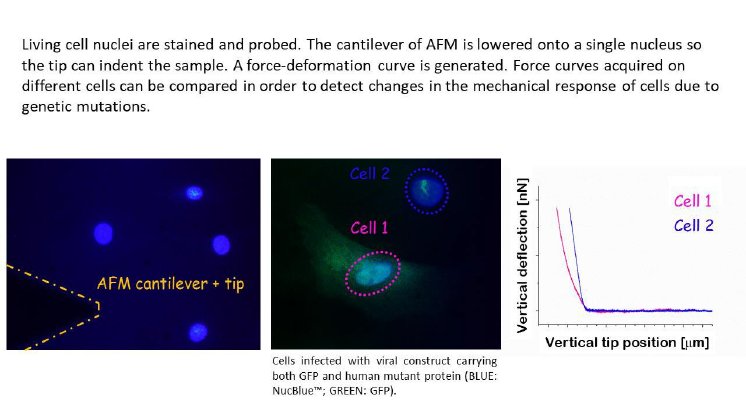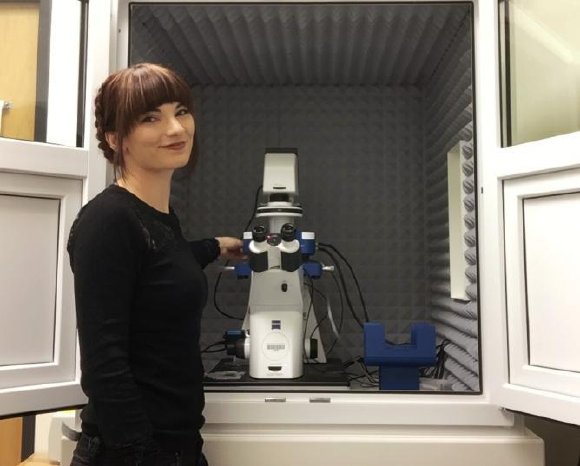Professor Luisa Mestroni heads a laboratory studying the genetics of cardiac muscle diseases. Based at the University of Colorado Denver and working in conjunction with labs in Italy, the lab's interest is in the genes causing dilated cardiomyopathy, arrhythmogenic right ventricular cardiomyopathy/dysplasia (ARVD/C), left ventricular noncompaction and hypertrophic cardiomyopathy.
One of the group's PhD students is Ilaria Pecorari. She is studying the effect of the scaffold on the cardiac cells cytoskeleton. This is mainly focused on the study of mechanical behaviour and mechanotransduction phenomenon in cells carrying a genetic mutation that is responsible for the onset of a pathological condition. She describes the study: "I am currently investigating the response of certain type of cells to different mechanical stimuli, i.e. exposure of cells to substrates with tunable stiffness, but I am also probing the mechanical response of "healthy" and mutant cells via atomic force microscopy (AFM). For the latter, I am exploiting the setup provided by JPK Instruments, in which the atomic force microscope (NanoWizard®4a BioSciences) is coupled with a fluorescence microscope. I infect cells with viral constructs, so they will express both green fluorescent protein (GFP) and the mutant protein known as the cause of disease. The NanoWizard® enables me to simultaneously identify the cells expressing the mutant protein and probe them mechanically. Through the force-deformation curves and their post-processing analysis, I can detect if the genetic mutation affects the mechanical behaviour of a single cell. In the near future, I'd like to assess the mechanical properties of wild type (i.e. "healthy") and mutant cells on substrates with different rigidities (thus either stiff or soft)."
Describing her experiences with AFM, Ms Pecorari continued; "Having been a user of AFM for eight years, I first used an AFM from JPK in 2016 while working under the supervision of Dr José Luis Toca-Herrera at the BOKU University in Vienna (Austria). Compared to other equipment I have used, the NanoWizard® is extremely user friendly. It is very intuitive, once the working principle of atomic force microscopy is clear. The variety of modes available, included the quantitative imaging (QI™) mode, allows the user to acquire a large variety of data on a sample. While working with living cells, it is crucial to control the temperature setting and the JPK PetriDishHeater™ is reliable and easy to use. The software for the post-processing of data is also very easy to use and quite automatic. So overall, I think that working with JPK's AFM has guaranteed a high degree of reliability of my observations."
This work has been published in a review article in Seminars in Cell & Development Biology published by Elsevier in 2017. The group has also published an interesting paper where the AFM is used to monitor the beating of cardiomyocytes grown on a 3D carbon nanotube scaffold. The lead author is Dr Brisa Peňa and is published in the ACS' Applied Materials & Interfaces. It may be viewed here.
For more details about JPK's AFM systems and their applications for the materials, life & nano sciences, please contact JPK on +49 30726243 500. Alternatively, please visit the web site: www.jpk.com or see more on Facebook: www.jpk.com/facebook and on You Tube: http://www.youtube.com/....



